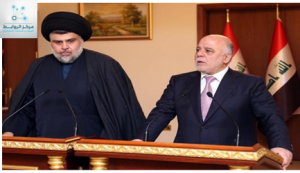Iraqi Prime Minister Haidar al-Abadi and the leader of the Sadrist movement Moqtada al-Sadr – Saturday – announced a coalition between their political blocs in order to form the largest bloc within the Iraqi Council of Representatives. “The new alliance is a way of sectarianism and ethnicity ,” Ebadi and Sadr told a news conference in the holy city of Najaf, south of Baghdad. Sadr met with Abadi in the framework of the latter’s attempt to develop a political position capable of avoiding a political crisis in Iraq in light of the recent legislative elections. They stressed the need to support and strengthen the army and police, and to hold arms in the hands of the state, indicating that the coalition will provide an integrated program to preserve the state, and maintain balanced relations with all countries. Abadi and Sadr surprised everyone by their surprise meeting, after tension their relationship against the backdrop of the alliance, which was announced earlier between the coalition, “Saroon” and the alliance,” Fatah” led by the leader of the popular crowd, Hadi al-Amiri. Abadi called to form a strong government backed by the Iraqi Council of Representatives to maintain the achievements of the victories and the provision of jobs and services and the development of economy, reconstruction and construction.
Al-Abbadi arrived yesterday afternoon in Najaf province to participate in the memorial ceremony held for the 40th anniversary of the leader of the popular crowd, Karim al-Khakani. A statement issued by the office of Abbadi said that during the ceremony he stressed that “the challenge we face today is no greater than the challenge of the terrorist gangs ISIS in reference to the problems that followed the announcement of the results of the general elections in the last May, adding: «This process can not be ended with the rigging of the elections and will not be part of the process of fraud and we must maintain the voice of the voter», stressing the «importance of forming a strong government backed by Parliament to maintai the victories achieved ».
Abadi said during a lecture at the Defense University for Military Studies in the Green Zone “There are groups that took advantage of the war against ISIS to store weapons in order to threaten the state, they wanted to be stronger than it, and blackmail citizens , which we will not allow. ” Abadi stressed that “there is high planning and wisdom to stand firm against them. There are citizens who have a weapon to defend themselves in the past, and they differ from those groups. There will be no weapons outside the state. ”
The Rawabet Center for Research and Strategic Studies has obtained the principles included in the document signed between Abadi and Sadr, which contained eight basic points: calling for the formation of a cross –sectarian- ethnic alliance ; continuing the fight against the corrupt and alienating them from the joints of the state; and forming a technocratic government of competencies away from quotas. Strengthening the army and the police by limiting the weapons to the hands of the state, developing a reform program to support the Iraqi economy, maintaining a balanced relationship with all countries, supporting reform of the Iraqi judiciary, activating the public prosecution and preserving Iraq’s unity.
The observers for the Iraqi issue see that the visit of Abadi to Najaf in order to mobilize more support for the expanded political meeting, which called for about ten days ago, in order to get out of the political suffocating crisis to which Iraq is exposed since the announcement of the results of the legislative elections last month, stressing that the Iraqi Prime Minister will meet with religious Marja and political leaders in Najaf in the last chance meetings, which precedes the possibility of a constitutional vacuum in Iraq, early next month.
And they see that the alliance of Abadi-Sadr is to produce a political project capable of meeting the requirements of the next phase, and avoid any repercussions may result from decisions taken by the Federal Court recently, including re-counting and sorting manually. They said their alliance reflected the failure of the bet on a coalition of small pro-Iranian blocs, and Sadr had to return to Abadi to move the consultations, especially as the alliance of Saroon with the Fatah linked to Iran has no internal or international support. The observers pointed out that al-Sadr and al-Amiri may achieve the quorum of the coalition to collect the small blocs to them, either through temptations or through Iranian pressure, but the absence of Abadi from any future government formation is losing external and internal support due to economic , security and political achievements achieved in his era.
Iraqi Studies Unit
Rawabet Center for Research and Strategic Studies

